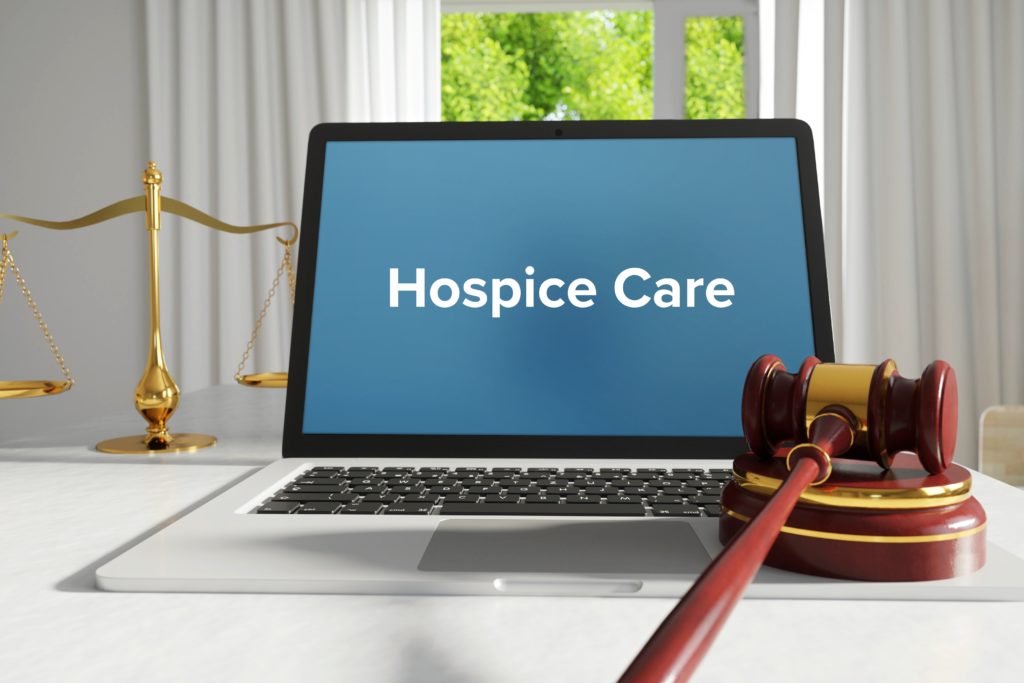Summary
In a perfect world, hospice care is a service that runs smoothly from start to finish. Unfortunately, issues arise along the way. Whether intentional or accidental, hospice fraud may be committed at your care facility. As a hospice care provider, you can be accused of hospice fraud, so it is imperative to understand what constitutes hospice care and fraud, examples of hospice fraud, and how to deal with a hospice fraud accusation. You must also know the possible consequences of losing a hospice fraud case and the best defense against it.

What is hospice care?
Hospice care, also known as end-of-life care, is an essential service in the healthcare industry. Knowing that a friend or a family member has a terminal illness is a heartbreaking experience. Hospice care focuses on providing compassionate care to those who are nearing the end of their life.
Having the option to offer someone medical care to increase their happiness for as long as possible is invaluable. Hospice care providers work to meet all the needs of their patients and improve their quality of life.
Hospice is an approach to care rather than a strict plan, so the details are adapted to fit the needs of the patient. There are various types of hospice care available, depending on the level of care required. Consulting a doctor, family members, and staff from a hospice care program can help patients decide what level of hospice care to choose. Hospice care locations include the patient’s home, an assisted living facility, or a nursing home.
Because not all hospice care is done in an ethical manner with the patient’s best wishes in mind, it is important to consider what actions at your facility can cause allegations of hospice fraud to arise.
What is hospice fraud?
Generally speaking, hospice fraud is defined as caregivers, organizations, or facilities taking advantage of patients or the public health systems that are paying for the cost of their hospice care. Hospice fraud is a costly experience for the victim, their family, and the government, with elaborate hospice fraud schemes collectively costing the U.S. government millions of dollars every year. It is also costly for hospice providers who are incorrectly accused of hospice fraud.
Improperly trained staff, along with documentation or billing errors, may lead to instances of accidental hospice fraud. These cases should be viewed in a different light to the rare cases of intentional hospice fraud.
The possibility of receiving a hospice fraud accusation is yet another reason to ensure that every member of your staff is aware of all the regulations in the hospice industry. These regulations include the conditions that underlie who qualifies to be a hospice patient and the steps that must be taken if the patient’s condition improves enough for their life expectancy to increase.

It is also important to reduce the frequency of billing errors as much as possible to avoid hospice fraud accusations. While criminal action may not be taken due to an innocent billing error, upset parties may still bring forward an accusation of hospice fraud.
If you have been accused of hospice fraud, you should consult an attorney and discuss the details of the accusation before proceeding.
Examples of Hospice Fraud
Here are some examples of how hospice providers can be accused of fraud:
Inadequate/Improper Care
- Hospices might reduce the frequency of home health visits to the patient, so they receive less care than needed. This can include substituting phone check-ins for on-site check-ins.
- Hospices can order inadequate medication to treat patients in order to save money, despite being obligated to make sure the patient gets the medications needed to reduce pain and maintain comfort.
- Hospices may refuse to provide oxygen to patients who need oxygen for any reason in order to save money.
- During a crisis, hospices might decline to provide continuous nursing in the patient’s home and tell the patient and their family that the hospice doesn’t have enough staff to provide adequate care in the patient’s home. This can cause the patient to be manipulated to receive care in the hospice facility, where the hospice will collect fees for room and board, which it wouldn’t receive if the patient were at home.
- Hospices receive payment on a per-diem basis, meaning they get a certain amount of money per patient signed on, for every day the patient is enrolled. The payment amount is set regardless of how many services or medications they provide, which financially rewards hospices that skimp on services and enroll more patients.
- Hospices might use Licensed Practical Nurses (LPN’s) to perform tasks that they are not allowed to perform. Only Registered Nurses (RN’s) may perform some tasks, and the hospice may use LPN’s or Home Health Aides without an RN’s supervision, despite it being required.
Billing
- Hospices may ask patients or their families to pay out of their own pocket for services that are being reimbursed by Medicare, Medicaid, or private insurance companies. The fraudulent billing to the patient or family may go undetected. If the patient or family does not know what is being billed to Medicare, Medicaid, or private insurance companies, they may not realize that double-billing is occurring.
- After manipulating a patient against their will into a hospice facility, the hospice may still bill Medicare, Medicaid, or private insurance for a more costly level of care, such as Continuous Care.
- A hospice might order medications or tools to treat a client, even though they are not required or helpful. Examples include purchasing a hospital bed for a patient who already has one and medication to “treat” a patient’s illness that cannot be treated. These costs are then fraudulently billed to Medicare.
Kickbacks
- Hospices can make arrangements with nursing homes or hospitals for referrals. The hospice may offer money to the hospital or nursing home for referring patients to the hospice, which is known as a kickback. This is illegal, and the patient or family has no way of knowing about the kickback.
False Diagnosis
- A hospice patient’s doctor must certify that a patient has six months or less to live in order for the hospice care to be covered under Medicare. Additionally, if a patient’s condition improves significantly enough for their life expectancy to improve beyond six months, the hospice is expected to discharge them. If a hospice does not have the appropriate doctor’s certification or if they fail to report significant changes in the patient’s health, they may be charged with hospice fraud.
How can you deal with a hospice fraud accusation?
If you have been accused of hospice fraud, you may be wondering how to navigate your defense. Due to the very personal nature of hospice care, accusations are sometimes made by someone who is trying to protect the patient. In some cases, these accusations are not fully factual and can lead to time-consuming and expensive lawsuits.
It is important to recognize what kind of hospice fraud you have been accused of. One of the most common types of hospice care lawsuits are False Claims Act lawsuits. The False Claims Act is a law meant to combat individuals or companies who defraud government healthcare programs.
Some of the most common hospice fraud involves false claims to Medicare or Medicaid, and the False Claims Act can be used to recover damages. The act empowers whistleblowers, who may be an employee of a hospice company, a family member of a patient, or anyone else involved with a hospice program to report the fraud. There is also a provision of the act, which entitles the whistleblower to some of the funds recovered by the government, further motivating individuals to report the fraud.
If you are facing a hospice fraud accusation, it is vital to do thorough research and carefully select an attorney with significant experience in this space.
What are the penalties of losing to a Hospice Fraud claim?
If you have been accused of hospice fraud, you may be concerned about the consequences of losing a case. It is important to understand the sanctions you may face and how they will affect your business.

Time
One of the consequences you will experience is a significant loss of time. Hospice fraud cases can be complicated and time-consuming, with some cases spanning several years. The time commitment these cases take can be immensely damaging to the day-to-day operations of your business.
It is vital to carefully research your choice of attorney. Choosing a hospice fraud lawyer with significant experience will improve your chances of winning the case and decrease the amount of time you spend working on a defense.
Money
Along with the time that must be invested into defending a hospice fraud claim, the defense is expensive from a monetary viewpoint as well. While long hospice fraud court battles can rack up legal fees, they pale in comparison to the penalties that can be imposed for losing the case. Hospice fraud cases have led to the DOJ seeking hundreds of millions of dollars in damages from the guilty party.
Reputation
Perhaps the most damaging consequence of losing a hospice fraud case is the effect on your company’s reputation. These cases often receive considerable media coverage, with stories being posted all around the internet. People looking to choose a hospice care provider will be doing plenty of research before making their choice. Seeing an article about a lost hospice fraud case will more than likely dissuade them from choosing a provider that has been convicted of hospice fraud.
What is the best defense?
If you have been accused of hospice fraud, conduct thorough research before selecting an attorney. In such a highly sensitive case, it is vital that your representation has significant experience in this space.
Hospice fraud cases are investigated by numerous different offices, entities, and personnel. Hospice fraud must be taken on a case-by-case basis. You will find that the best defense is working with someone that is adaptable to your unique situation.
Familiarity with the variety of hospice fraud cases and statutes is arguably the most important factor to consider when selecting an attorney.